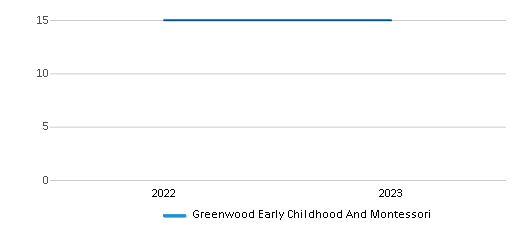Greenwood Early Childhood And Montessori ranks in the top 30% of all schools in South Carolina for overall test scores (math proficiency is top 30%, and reading proficiency is top 30%).
The percentage of students achieving proficiency in math was 50-59% (which was higher than the South Carolina state average of 41%). The percentage of students achieving proficiency in reading/language arts was 60-69% (which was higher than the South Carolina state average of 52%).
Top Rankings
Greenwood Early Childhood And Montessori ranks among the top 20% of public schools in South Carolina for:
Category
Attribute
Science Proficiency
School Overview
Grades Offered
Grades Prekindergarten-5
Total Students
n/a
Total Classroom Teachers
15 teachers

School Rankings
Overall Testing Rank
#307 out of 1154 schools
(Top 30%)
(Top 30%)
Math Test Scores (% Proficient)
50-59%
41%
Reading/Language Arts Test Scores (% Proficient)
60-69%
52%
Science Test Scores (% Proficient)
60-79%
50%
Student : Teacher Ratio
n/a
14:1
School Statewide Testing
School District Name
Source: National Center for Education Statistics (NCES), SC Dept. of Education
Frequently Asked Questions
What is Greenwood Early Childhood And Montessori's ranking?
Greenwood Early Childhood And Montessori is ranked #307 out of 1,154 schools, which ranks it among the top 30% of public schools in South Carolina.
What percent of students have achieved state testing proficiency in math and reading?
50-59% of students have achieved math proficiency (compared to the 41% SC state average), while 60-69% of students have achieved reading proficiency (compared to the 52% SC state average).
What grades does Greenwood Early Childhood And Montessori offer ?
Greenwood Early Childhood And Montessori offers enrollment in grades Prekindergarten-5
What school district is Greenwood Early Childhood And Montessori part of?
Greenwood Early Childhood And Montessori is part of Greenwood 50 School District.
Recent Articles

What Is A Charter School?
Explore the world of charter schools in this comprehensive guide. Learn about their history, how they operate, and the pros and cons of this educational innovation. Discover key facts about charter schools, including admission policies, demographics, and funding, as well as what to look for when considering a charter school for your child.

10 Reasons Why High School Sports Benefit Students
Discover the 10 compelling reasons why high school sports are beneficial for students. This comprehensive article explores how athletics enhance academic performance, foster personal growth, and develop crucial life skills. From improved fitness and time management to leadership development and community representation, learn why participating in high school sports can be a game-changer for students' overall success and well-being.

February 05, 2025
Understanding the U.S. Department of Education: Structure, Impact, and EvolutionWe explore how the Department of Education shapes American education, from its cabinet-level leadership to its impact on millions of students, written for general audiences seeking clarity on this vital institution.












